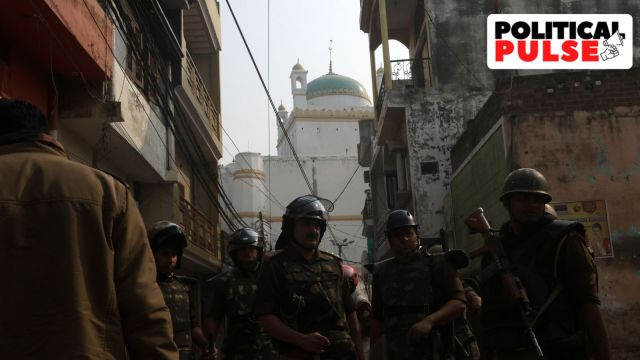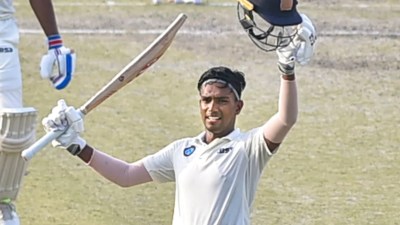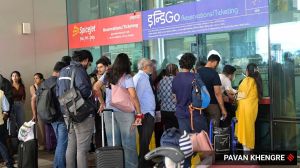Sambhal to Ajmer: Sangh Parivar silence betrays unease after Bhagwat’s note of caution
Several RSS leaders told The Indian Express that making “too many such claims", some of which may turn out to be frivolous, could weaken the cases where Hindus have “genuine claims such as Kashi and Mathura”
 On November 24, four people died of gunshot wounds metres away from the mosque after violence broke out after a survey team showed up at the mosque in Sambhal and police were deployed at the spot.
On November 24, four people died of gunshot wounds metres away from the mosque after violence broke out after a survey team showed up at the mosque in Sambhal and police were deployed at the spot.THE silence of the Sangh Parivar on the latest petitions filed in local courts claiming Hindu rights over Shahi Jama Masjid in Sambhal as well as Ajmer Sharif Dargah in Ajmer, betrays a sense of both unease and uncertainty.
Ideologically, this move resonates with the RSS’s claim that multiple Hindu temples were destroyed and converted into mosques by Islamic invaders. Indeed, the Ram Janmabhoomi moment that led to the demolition of Babri Masjid in Ayodhya — and the launch of the Ram Temple this year in the wake of the 2019 Supreme Court judgment is seen as the Sangh’s ideological triumph.
However, the latest petitions also strike some discordant chords within.
Several RSS leaders told The Indian Express that making “too many such claims”, some of which may turn out to be frivolous, could weaken the cases where Hindus have “genuine claims such as Kashi and Mathura”. Sources said the Sangh has even advised restraint to certain petitioners who have reached out to it for guidance.
“We had three key issues — Ram Mandir, Kashi and Mathura. One (Ram Temple) is done and the other two are on track. By making such claims everywhere randomly, it hurts our genuine cases. People begin to believe they too are being claimed as part of some political agenda and are based on frivolous grounds,” a Sangh leader said.
None of the RSS leaders was willing to make any comments over the issue on record, though.
This silence is not without reason.
In June 2022, amid a legal battle in Varanasi following a petition claiming Hindu rights over Gyanvapi mosque, RSS chief Mohan Bhagwat had said: “Hindus are not opposed to Muslims. The ancestors of Muslims were Hindus. Many feel that what was done (the demolition of temples) was done to break the morale of Hindus. A section of Hindus now feels that these temples need to be reconstructed. (But) one should also not raise a new issue every day. Why escalate fights? On Gyanvapi, our faith has been there for generations. What we are doing is fine. But why look for a Shivling in every mosque?”
Bhagwat was addressing the RSS workers in Nagpur following the conclusion of a training session.
“What happens in mosques is also a form of prayer. Okay, it has come from outside. But Muslims who have accepted it are not outsiders, they need to understand this. Even if their prayer is from outside (this country), and they wish to continue with it, we are fine with it. We are not opposed to any form of worship,” the RSS chief had also said.
Since then, these words haven’t found much of an echo in the Sangh even as case after case has been filed claiming Hindu rights over sites such as Kamal Maula mosque in Madhya Pradesh’s Dhar and even Qutub Minar in Delhi and Taj Mahal in Agra.
One reason for the RSS silence despite Bhagwat’s cautionary note is, of course, that these petitions apparently have the support of the Sangh cadre who feel that “historical injustice” against the Hindu community must be “corrected”. At the same time, these petitions, by keeping the communal pot on simmer, also add to the rich fodder for elections — consider the refrain in Jharkhand and Maharashtra on infiltration and Hindu unity.
Yet, sources said, the Sangh has adopted a “wait-and-watch policy” over the Sambhal and Ajmer petitions to see how they play out in the courts before deciding to either engage with them or denounce them. On November 29, the Supreme Court ordered that the Sambhal survey be under sealed cover and it asked the trial court to pause proceedings until the masjid committee approaches the High Court.
The Sangh’s unease also stems from the supposed “randomness” of some of these petitions which is not necessarily related to the idea of making such bids in the first place.
For instance, the temple side’s claims over Gyanvapi mosque and Mathura Idgah mosque have been issues close to the RSS. In fact, some of its past resolutions have flagged them even before the Ayodhya row snowballed. Also, the Sangh has largely refrained from making specific claims on other such sites so far.
A senior RSS leader insisted that the Sangh “has not formed an opinion” as yet on the Sambhal and Ajmer petitions, adding that these matters need to be seen on “case-to-case basis”. He, however, underlined that Bhagwat’s 2022 advice to not look for Shivling in every mosque should “also be understood”.
“There is no point in digging up all the graves. But these matters have to be seen on case-to-case basis. If there are genuine claims, they have to be seen in light of correct perspective and situation in the country. After all there is the Waqf issue too…The Waqf Board is claiming whichever property you like. As for Sambhal, the priority is that peace must be established first. We can think about the issues later,” the RSS leader said.
He also echoed an old Sangh line, saying “The RSS has no control over an awakened Hindu society”. He, however, added: “But what Bhagwat ji has said (in 2022) remains our stand and his statement must be understood.”
There were others within the Sangh Parivar who felt that certain individuals were raking up these rows for quick publicity and swift political gains.
“Now that there is a BJP government in power, everyone is professing to be from the Sangh Parivar. Some people are using these suits for publicity. They feel they might get some rewards or they have some political ambitions. But RSS does not have such short-term goals. It is a very disciplined organisation. We don’t function like this,” another senior Sangh leader said.
Another leader said the basic aim of the Ram Temple movement was to “restore dignity of the Hindu society” and “give it confidence”. With the construction of the Ram Temple and a “positive atmosphere” around Kashi and Mathura issues, the issue has been addressed to a great extent, he added.
- 01
- 02
- 03
- 04
- 05































